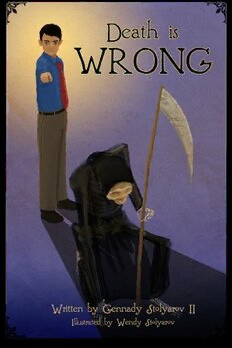Table Of ContentDeath is Wrong
Gennady Stolyarov II
Illustrated by Wendy Stolyarov
Second Edition
Copyright 2013, 2014 Rational Argumentator Press
ISBN 978-0615932040
This is the book I would have wanted to have as a child, but did
not. Now that you have it, you can discover in less than an hour
what it took me years to learn in bits and pieces. You can
instead spend those years fighting the greatest enemy of us all:
death.
Gennady Stolyarov II
1
When I was little, numbers fascinated me. I learned to count at
age 2, before I even learned to read. When I was 4 and living in
the city of Minsk, I was introduced to years as a way of tracking
time. I saw a shiny new ruble coin with the number “1991”
written on it – one of the last coins of the Soviet Union. By
then I was already comfortable with numbers up to one googol
– 1 followed by 100 zeroes. But my first notion, when I learned
about years, was that 1991 years were all that had been.
I recall being told that my grandfather was a child during the
years “41” through “45”, when the Nazis invaded the Soviet
Union and he had to flee. I did not know that these numbers
were abbreviations for “1941” and “1945”, so I made the
reasonable guess that my grandfather was around close to the
beginning of time.
But I was also curious about what the passage of time would do
to people. Once I asked my mother what happens when people
grow up. “They go to school,” she replied. “And then?”
“Then they go to university.” “And then?”
“They work and get married.” “And then?”
2
3
“They have children.” “And then?”
“Their children have children. They retire and help raise their
grandchildren.” “And then?”
“Their grandchildren have children.” 3 of my 8 great-
grandparents were still alive at that time. “And then?”
“And then they die.”
“Die? What does that mean?” “It means they stop existing.
They are just not there anymore.”
“But why do they die? Do they do anything bad to deserve it?”
“No, it happens to everyone. People get old and then die.” “It is
wrong!” I exclaimed. “People should not die!”
I asked how long people live before they die. “100 years,” I was
told, probably to console me. I liked big, round numbers, and
100 was still somewhat big to me back then. Somehow, through
that conversation, I got the notion that everyone lived until 100
years, and that I had a guaranteed 96 years left. I was also told
that only adults can die, not children. All this was likely meant
to comfort me, as the thought of dying disturbed me visibly.
4
5
Still, even 100 years did not seem enough to me. I did not
know about conventional superheroes yet, though I did start
reading ancient and medieval myths and folk tales. I would
spend many hours making up stories of my own and jotting
down quick pictures in long, thick notebooks. My superheroes
were old wise men who traveled the world on magic carpets.
They had exceptionally long beards, longer than my
grandfather’s gray beard, since they were much older. To me, a
beard became a symbol of living to an old age; the older a man
was, the longer a beard he got to have. I, too, decided that I
would grow a beard when I could, and I would never shave it –
as a reminder of a part of myself I never wanted to lose.
I specified the ages of these wise men. I remember one who was
104, one who was 115, and even one who was 140. They all
lived past 100 years, and they flew on their magic carpets
among skyscrapers that were each over 100 stories tall. They
flew to the Moon and to the planets of the Solar System, which
I had memorized. They defied the limits that others considered
insurmountable, and they experienced adventures that, for very
old men, were supposed to be impossible.
As I started to read history books and watch films, it did not
take me long to find out that most people did not survive to age
6
100, and that, yes, even children could die. May 9, 1992, was
celebrated as Victory Day – the 47th anniversary of the Soviet
Union’s defeat of Nazi Germany in World War II. All the
television stations showed old historical films, including images
of Nazi persecution of Russian civilians when the war began in
1941. I learned that the Nazis shot and hanged millions of
innocent people. I found out that, in addition to dying of old
age, people could be killed, and no one was invulnerable.
The old Soviet films showed that some of the “heroes” who
fought back against the Nazis were younger than 15 years old.
Some of these child soldiers were made to suffer horribly before
they were killed, but, apparently, they did not betray their
Motherland. They were praised without limit for having given
their lives for their country, but to me, what happened to them
was just sad. They should have tried to escape and live as long
as they could, I thought. There was no glory in death, and no
point in it.
The more I learned about possible ways people could die, the
more alarmed I became. I realized that the risk of death was
always nearby. There were so many possible illnesses – cancer,
pneumonia, heart disease, diabetes – and accidents – car
crashes, falls, sharp tools that slipped from one’s hand – all of
7

